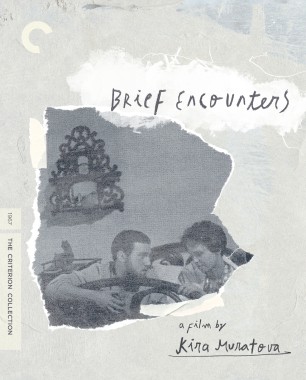Brief Encounters / The Long Farewell: Two Films by Kira Muratova

Nobody made films like Kira Muratova. Uncompromising and uncategorizable, the Ukrainian iconoclast withstood decades of censorship to realize her singular vision in hypnotically beautiful, expressionistically heightened films that remain unique in their ability to evoke complex interior worlds. Her first two solo features, Brief Encounters and The Long Farewell, are fascinatingly fragmented portraits of women navigating work, romance, and family life with a mix of deep yearning and playful pragmatism. Long suppressed by Soviet authorities, these films became legendary—along with their maker—and they now make for a revelatory introduction to this most fearlessly original of artists.
Films In This Set
-

Brief Encounters
1967
Kira Muratova’s first solo feature already displays her sui generis approach to cinema, in an impressionistic portrait of women at work and in love. Through an intricate play of flashbacks and shifting perspectives, Brief Encounters reveals the tangled romantic triangle that connects a hard-nosed city planner (played by Muratova herself), her free-spirited geologist husband (legendary Soviet protest singer Vladimir Vysotskiy), and the young woman from the countryside (Nina Ruslanova) whom she hires as her housekeeper. Blending observational realism with striking New Wave–style experimentation, Muratova crafts a wryly perceptive study of two very different women bound by chance and each navigating her own career, dreams, and disappointments.
-

The Long Farewell
1971
With its daring formalist freedom, Kira Muratova’s pointillist family portrait so perplexed and unnerved Soviet censors that it effectively halted her career for years afterward. A kind of psychological breakup movie, The Long Farewell traces the growing rift that develops between an emotionally impulsive single mother (stage legend Zinaida Sharko, transcendent in one of her first film roles) and her increasingly resentful teenage son (Oleg Vladimirsky), who upends her world when he announces that he wishes to live with his faraway father. The seemingly simple premise is rendered anything but by Muratova’s dreamy, drifting style, with off-kilter framing, editing, and dialogue continually pushing cinema’s aesthetic and expressive boundaries outward.
TWO-DISC SPECIAL EDITION FEATURES
- New 4K digital restorations, with uncompressed monaural soundtracks on the Blu-ray edition
- Interviews with scholars Elena Gorfinkel and Isabel Jacobs
- Archival interview with director Kira Muratova
- PLUS: An essay by film critic Jessica Kiang
New cover by La Moutique
Films In This Set
-

Brief Encounters
1967
Kira Muratova’s first solo feature already displays her sui generis approach to cinema, in an impressionistic portrait of women at work and in love. Through an intricate play of flashbacks and shifting perspectives, Brief Encounters reveals the tangled romantic triangle that connects a hard-nosed city planner (played by Muratova herself), her free-spirited geologist husband (legendary Soviet protest singer Vladimir Vysotskiy), and the young woman from the countryside (Nina Ruslanova) whom she hires as her housekeeper. Blending observational realism with striking New Wave–style experimentation, Muratova crafts a wryly perceptive study of two very different women bound by chance and each navigating her own career, dreams, and disappointments.
-

The Long Farewell
1971
With its daring formalist freedom, Kira Muratova’s pointillist family portrait so perplexed and unnerved Soviet censors that it effectively halted her career for years afterward. A kind of psychological breakup movie, The Long Farewell traces the growing rift that develops between an emotionally impulsive single mother (stage legend Zinaida Sharko, transcendent in one of her first film roles) and her increasingly resentful teenage son (Oleg Vladimirsky), who upends her world when he announces that he wishes to live with his faraway father. The seemingly simple premise is rendered anything but by Muratova’s dreamy, drifting style, with off-kilter framing, editing, and dialogue continually pushing cinema’s aesthetic and expressive boundaries outward.

TWO-DISC SPECIAL EDITION FEATURES
- New 4K digital restorations, with uncompressed monaural soundtracks on the Blu-ray edition
- Interviews with scholars Elena Gorfinkel and Isabel Jacobs
- Archival interview with director Kira Muratova
- PLUS: An essay by film critic Jessica Kiang
New cover by La Moutique
A scene from Brief Encounters
A scene from The Long Farewell

Brief Encounters

Brief Encounters

The Long Farewell

The Long Farewell

Brief Encounters